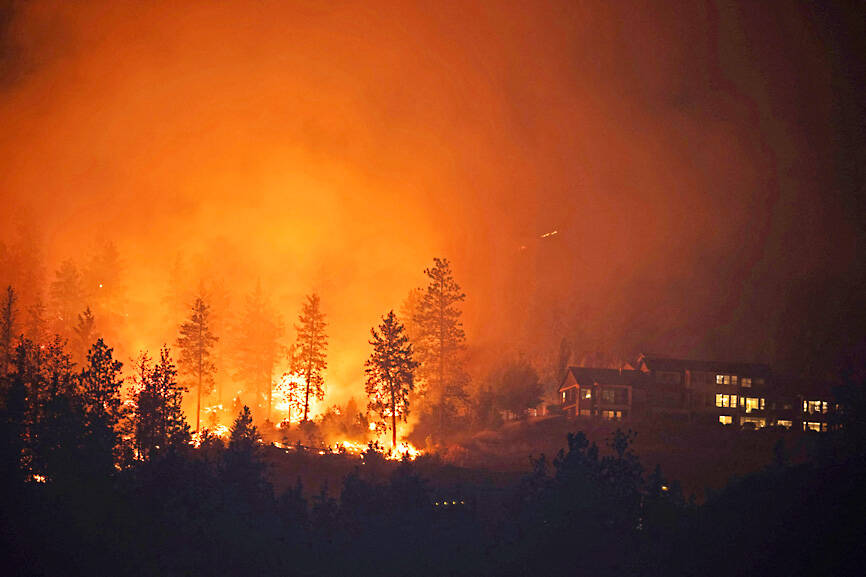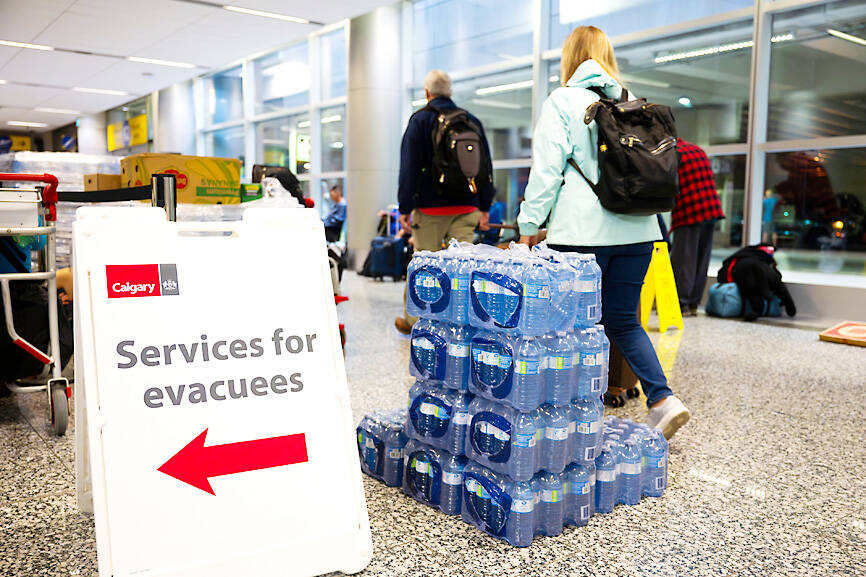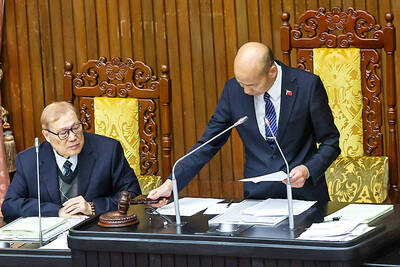Wildfires on Friday bore down on two Canadian cities, with firefighters in the west bracing for another “scary” night as stunned refugees from the far north began arriving at shelters after their entire city was evacuated.
The two fronts in British Columbia and the Northwest Territories are just the latest in a summer of devastating wildfires across the country that have forced tens of thousands from their homes and left millions of hectares scorched.
The blazes have caused “terrible loss,” Canadian Prime Minister Justin Trudeau told reporters after meeting evacuees from Yellowknife, the capital of the Northwest Territories, as they arrived in Edmonton, Alberta, hundreds of kilometers to the south with no idea when they would return home again.

Photo: Reuters
Meanwhile, British Columbia Premier David Eby declared a state of emergency in the province late on Friday.
The announcement came as the fire burning west of Kelowna, a town of 150,000 people in the Okanagan Valley, exploded a hundred fold in size to 6,800 hectares in the past day.
Officials described firefighters being forced to pull back and some becoming trapped behind lines while making “heroic efforts” to rescue residents.

Photo: AFP
“We fought hard last night to protect our community,” local fire chief Jason Brolund told a briefing. “A significant number of structures were lost,” he said, but no injuries or fatalities were reported.
“It was like 100 years of firefighting all at once, in one night,” he said, adding that he expected “another scary night tonight” under an eerie glow of the fires.
Thousands of households on Kelowna’s west side were ordered evacuated or told late on Thursday to be ready to leave at a moment’s notice.
“The situation is unpredictable right now and there are difficult days ahead,” Eby told a news conference.
In the far north, Yellowknife was a ghost town late on Friday after ordering its entire population to leave by the afternoon — the largest ever evacuation from the region.
Most of its 20,000 inhabitants left by road to the nearest evacuation center 1,150km away in Alberta, where several sites had been set up.
Almost 4,000 people flew out, officials said, with a pilot on one of the relief flights telling Canadian media that the lakeside city was “pretty empty.”
Yellowknife has not been abandoned: Crews remained to erect defenses as the flames approached, while water bombers have been seen and the Canadian military is also helping out.
Several towns and Indigenous communities had already been evacuated.
The evacuation from Yellowknife means half the population of the near-arctic territory has been displaced.

DEFENDING DEMOCRACY: Taiwan shares the same values as those that fought in WWII, and nations must unite to halt the expansion of a new authoritarian bloc, Lai said The government yesterday held a commemoration ceremony for Victory in Europe (V-E) Day, joining the rest of the world for the first time to mark the anniversary of the end of World War II in Europe. Taiwan honoring V-E Day signifies “our growing connections with the international community,” President William Lai (賴清德) said at a reception in Taipei on the 80th anniversary of V-E Day. One of the major lessons of World War II is that “authoritarianism and aggression lead only to slaughter, tragedy and greater inequality,” Lai said. Even more importantly, the war also taught people that “those who cherish peace cannot

STEADFAST FRIEND: The bills encourage increased Taiwan-US engagement and address China’s distortion of UN Resolution 2758 to isolate Taiwan internationally The Presidential Office yesterday thanked the US House of Representatives for unanimously passing two Taiwan-related bills highlighting its solid support for Taiwan’s democracy and global participation, and for deepening bilateral relations. One of the bills, the Taiwan Assurance Implementation Act, requires the US Department of State to periodically review its guidelines for engagement with Taiwan, and report to the US Congress on the guidelines and plans to lift self-imposed limitations on US-Taiwan engagement. The other bill is the Taiwan International Solidarity Act, which clarifies that UN Resolution 2758 does not address the issue of the representation of Taiwan or its people in

The Philippines yesterday criticized a “high-risk” maneuver by a Chinese vessel near the disputed Scarborough Shoal (Huangyan Island, 黃岩島) in a rare incident involving warships from the two navies. The Scarborough Shoal — a triangular chain of reefs and rocks in the contested South China Sea — has been a flash point between the countries since China seized it from the Philippines in 2012. Taiwan also claims the shoal. Monday’s encounter took place approximately 11.8 nautical miles (22km) southeast” of the Scarborough Shoal, the Philippine military said, during ongoing US-Philippine military exercises that Beijing has criticized as destabilizing. “The Chinese frigate BN 554 was

LEISURE: The new law adds Confucius’ birthday, the anniversary of the Battle of Guningtou, Constitution Day and Little New Year as national holidays The Legislative Yuan yesterday passed new legislation adding four national holidays and making Workers’ Day a national holiday for all sectors. The Chinese Nationalist Party (KMT) and the Taiwan People’s Party used their combined majority in the legislature to push the jointly proposed draft through its third and final reading. This new law supersedes the existing regulations for the implementation of memorial days and state holidays, which are administered by the Ministry of the Interior. The new law recognizes Confucius’ birthday on Sept. 28, the anniversary of the Battle of Guningtou on Oct. 25, Constitution Day on Dec. 25 and “Little New Year,”